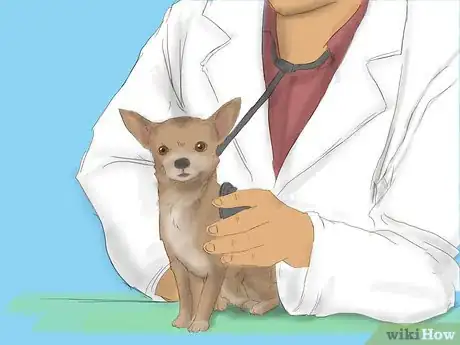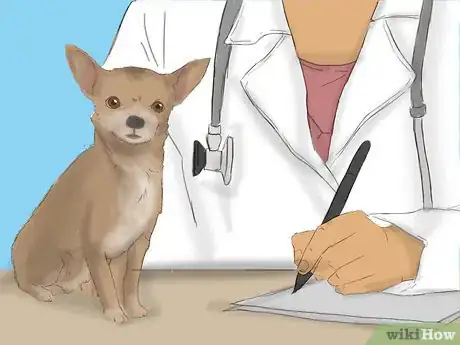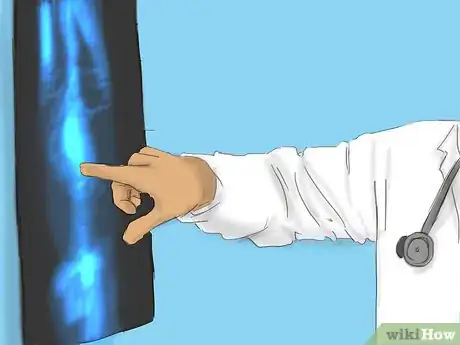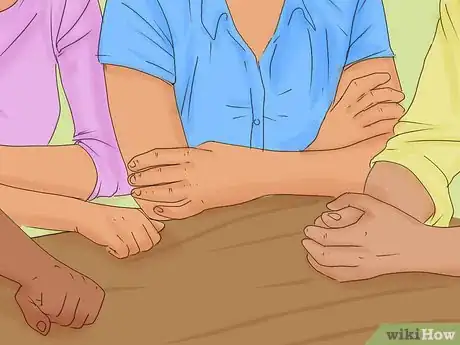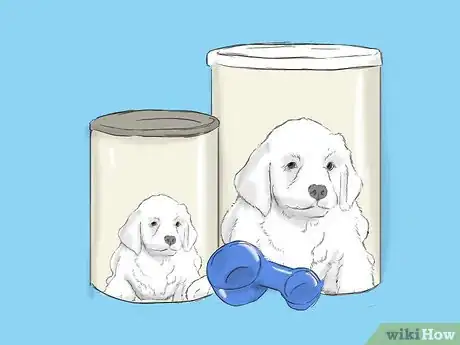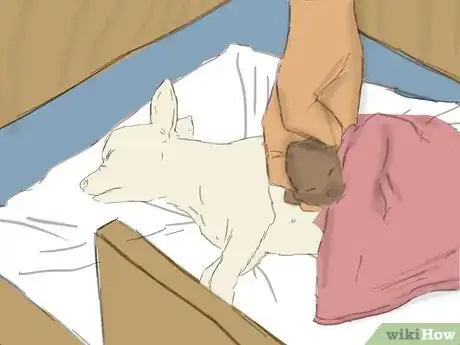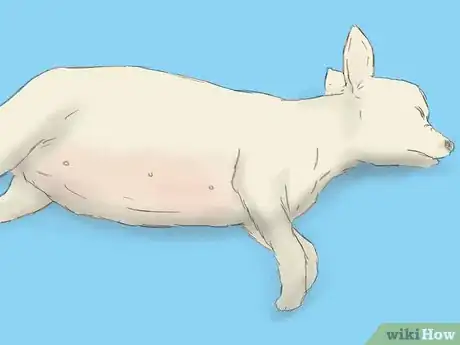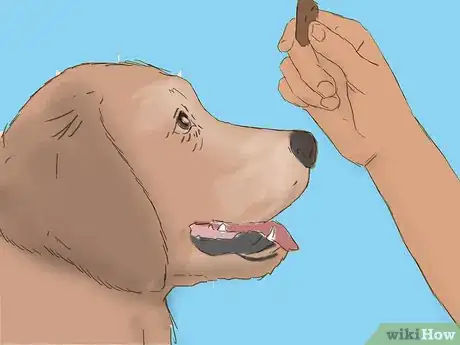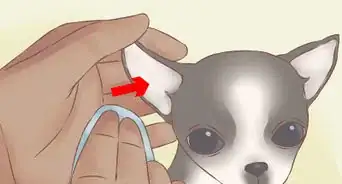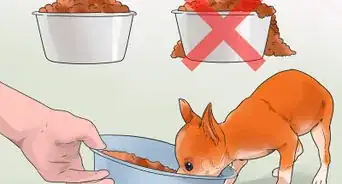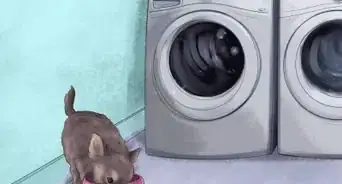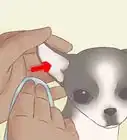wikiHow is a “wiki,” similar to Wikipedia, which means that many of our articles are co-written by multiple authors. To create this article, volunteer authors worked to edit and improve it over time.
wikiHow marks an article as reader-approved once it receives enough positive feedback. In this case, 90% of readers who voted found the article helpful, earning it our reader-approved status.
This article has been viewed 64,998 times.
Learn more...
Handling a dog during pregnancy can require some extra care. While this article is directed towards Chihuahuas and other small dogs, it may be helpful for larger breed owners as well, and is intended to provide a foundation for understanding the pregnancy before the labor process.
Steps
Preparing for Your Chihuahua's Pregnancy
-
1Take your dog to the veterinarian before she becomes pregnant. If you expect to breed your dog, take her to the vet beforehand.[1] If your dog becomes pregnant unexpectedly, take her as soon as you become aware of it.
- If you plan to breed your dog, it’s recommended that you wait until she’s at least 24 months old, which will allow the dog to fully mature so any medical problems that may affect a pregnancy will become apparent.
- Small dog breeds may have genetic conditions that are important to be aware of before breeding, including dental problems, dislocating patellas, hip dysplasia, spine problems, allergies, heart conditions, and/or behavioral problems. If your dog has these problems, do not breed her.
- Make sure that your dog is up to date on vaccines. Her antibodies will be passed on to the puppies through her milk and will help protect the puppies from getting sick.
- Make sure that your dog is on a deworming program. Roundworms, hookworms, heartworms and others can be passed from a mother to her puppies.
-
2Make sure your dog is getting the right kind of nutrition. Your vet can offer recommendations as to the best food for her during her pregnancy. If your pregnant dog is not obese, your vet may recommend feeding her puppy food in the latter weeks of her pregnancy.
- The higher calories in puppy food will help the mother pass on additional nutrition to her growing puppies.
- Avoid supplements such as calcium unless your veterinarian prescribes them. Milk fever, or eclampsia, is common for small breed dogs a few weeks after giving birth, and it’s more likely to occur with over supplementation of calcium during pregnancy.
Advertisement -
3Prepare for the due date. The average gestation period for a dog is between 58 and 68 days. Calculate the dog's expected due date based on the date of conception, so that you'll be prepared when the time for labor comes.
- Your pregnant chihuahua is likely to display nesting behaviors and may withdraw from people in the final weeks of her pregnancy. This is normal.
-
4Have your veterinarian take x-rays of the puppies. At 45 days of pregnancy, the vet will be able to count the number of puppies in the litter using x-rays.
- Since a Chihuahua is a small breed dog, 3 or 4 puppies in a litter is plenty. However, if only one or two are seen, that may pose problems at the time of birth. Fewer puppies mean the puppies will be larger and may be too big to pass through the birth canal naturally, so a planned C-section would be best.
- Though a planned C-section will be more costly, it will still be cheaper than an emergency C-section, so plan ahead.
-
5Set up a nesting area. About a week before your dog is due to begin labor, find a quiet area where your chihuahua will be able to give birth in peace. A cozy box or dry paddling pool in a calm and quiet area should do the trick; add old towels or blankets for comfort, and make sure they're clean.
-
6Arrange for homes for the puppies. As soon as you know your dog’s pregnant, whether it was planned or not, begin arranging for homes for the puppies.
- If you aren’t able to find homes for all of the puppies, be prepared to keep them yourself until you can find them a home. Thousands of dogs end up in over-crowded shelters because irresponsible owners breed their dogs without providing homes for the puppies. Don’t be part of the problem.
- Prepare to live with puppies for a minimum of 8 weeks before they leave your house for new homes. In certain states like California, it’s illegal to adopt out a puppy younger than 8 weeks of age.
- To ensure the puppies go to good homes, have an application process and ask questions of the interested parties. It’s also recommended that you charge a modest amount for each puppy to ensure the interested parties are serious about and committed to adopting the puppy.
-
7Buy puppy formula ahead of time. Newborn puppies will need to be fed every 2-4 hours around the clock, and if a puppy has trouble nursing, you want to have formula on hand to feed it.
- You can buy puppy formula at most pet supply stores.
-
8Isolate the mother three weeks before expected delivery. To protect the mother and her puppies from contracting illness or disease like canine herpes, confine her away from all other dogs in the three weeks leading up to her expected delivery date.[2]
- It’s also highly advisable to keep the mother away from other dogs for three weeks following the delivery.
-
9Prepare for the actual delivery. When the time comes, help your chihuahua through their labor. You can find a detailed guide specifically on labour at How to Help Your Chihuahua During Labor.
Understanding Your Dog’s Pregnancy
-
1Know when your dog is able to conceive. Your dog is able to conceive as soon as she enters her first heat cycle, which can be as young as 4 to 7 months old.[3]
- When your dog is in heat, she will attract male dogs and may even actively seek them out. Other dogs can detect the scent of a female dog in heat from miles away; thus it’s extremely important that you keep very close watch on a dog in heat and confine her indoors at all times to avoid unwanted pregnancy.
- A Chihuahua may conceive even if you think you intervened before copulation was completed.
- A Chihuahua can be impregnated by a much larger dog (or dogs), in which case pregnancy and labor can become increasingly risky. Avoid this situation as far as possible. Ideally, the female should be larger than the impregnating male. If your dog is impregnated by a larger dog, seek your veterinarian’s advice.
-
2Know the signs of pregnancy. A dog will begin to show key symptoms that can help you determine if she’s likely pregnant, including:[4]
- Lethargy
- Reduced appetite or vomiting
- Rapidly enlarging stomach that feels firm (the stomach will be visibly swollen by 15-30 days into the pregnancy)
- Nipples will enlarge and protrude
- Note that while some reduced appetite and/or nausea is normal, it should resolve itself within about a week. If it lasts longer than that or occurs along with listlessness, it could be a sign of something more serious and you should bring your dog to the vet.[5]
-
3Be careful of giving your pregnant dog medication or vaccines. Unless directly instructed by your vet, you should not give your dog medications unsafe for pregnancy, and you shouldn’t have her vaccinated.[6]
- Ideally, your dog should have been vaccinated before she became pregnant. But if not, don’t vaccinate her while pregnant, as some vaccines can be harmful to developing fetuses.
- If using flea control, be sure to use a product that’s safe for use on pregnant dogs.
Community Q&A
-
QuestionDo I have to keep the father of the pups separate from them?
 Community AnswerThe father should not mind the pups. If he shows aggression, yes, keep him away, but mom, dad, and babies should be fine together. After a few weeks, you'll notice that mom and dad both get super sick of the pups. This is normal, but they should not be aggressive.
Community AnswerThe father should not mind the pups. If he shows aggression, yes, keep him away, but mom, dad, and babies should be fine together. After a few weeks, you'll notice that mom and dad both get super sick of the pups. This is normal, but they should not be aggressive. -
QuestionMy chihuahua is pregnant and I don't know the male dog or time it became to which she was pregnant. What can I do?
 Community AnswerMaybe take her to a vet or watch out for other animals that have been around the house.
Community AnswerMaybe take her to a vet or watch out for other animals that have been around the house. -
QuestionCan my dog take vitamins during pregnancy? What should she eat?
 Community AnswerTalk to your vet about what is best for your dog during her pregnancy.
Community AnswerTalk to your vet about what is best for your dog during her pregnancy.
Warnings
- A female dog that has not been spayed has the potential to get a uterine infection called a pyometra after each time she has been in heat. This is a serious and potentially life-threatening condition that requires immediate veterinary care. Watch your dog after each heat cycle to be sure she isn’t showing signs of illness like vomiting, loss of appetite, or excessive thirst.[7]⧼thumbs_response⧽
References
- ↑ http://www.veterinarypartner.com/Content.plx?A=1459
- ↑ http://www.veterinarypartner.com/Content.plx?P=A&S=0&C=0&A=1459
- ↑ http://www.petchidog.com/chihuahua-pregnancy
- ↑ http://www.petchidog.com/chihuahua-pregnancy
- ↑ http://www.veterinarypartner.com/Content.plx?P=A&S=0&C=0&A=1459
- ↑ http://www.veterinarypartner.com/Content.plx?A=1459
- ↑ http://www.veterinarypartner.com/Content.plx?P=A&S=0&C=0&A=603
- ↑ http://www.purina.co.uk/content/your-dog/life-changes/pregnancy-in-dogs/labour-and-giving-birth-for-dogs
